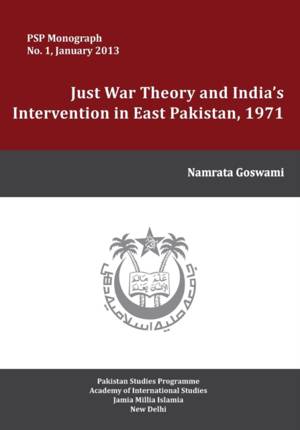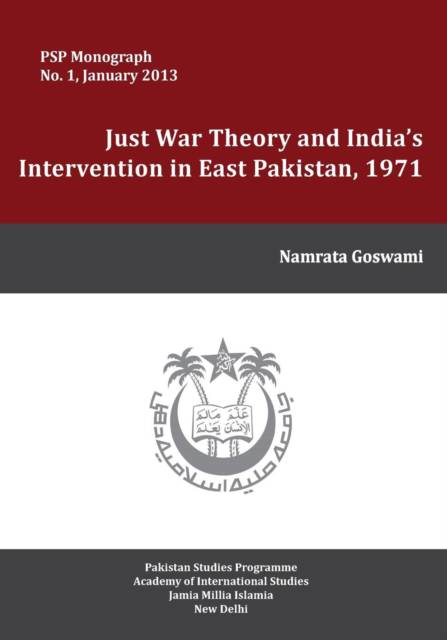
- Retrait gratuit dans votre magasin Club
- 7.000.000 titres dans notre catalogue
- Payer en toute sécurité
- Toujours un magasin près de chez vous
- Retrait gratuit dans votre magasin Club
- 7.000.0000 titres dans notre catalogue
- Payer en toute sécurité
- Toujours un magasin près de chez vous
Just War Theory and India's Intervention in East Pakistan, 1971
Namrata Goswami
Livre broché | Anglais
57,95 €
+ 115 points
Description
This study offers an assessment of the Indian Intervention in East Pakistan in 1971 by locating it within the framework of Just War Theory. The Just War Theory has evolved two streams of thought in judging the use of force. These are the jus ad bellum (recourse to war) and the jus in bello (conduct in war). The jus ad bellum has six principles. They include: just cause, competent authority, right intention, force must be the last resort, proportionality of ends and probability of success. Jus in bello has two principles; namely, proportionality of means, and discrimination and non-combatant immunity. The study makes the argument that the Indian intervention in East Pakistan qualifies as one of the fit cases of humanitarian intervention when judged through the criteria of Just War Theory as it resulted in a positive humanitarian outcome for the East Pakistanis. India's argument was that its use of force was in conformity with the humanitarian purposes of the UN Charter. The intervention not only ended the West Pakistan military operation in the East, but also restored the political rights of the Bengalis. The intervention also enabled the ten million or so Bengali refugees, who had fled from East Pakistan to India, to return home. India's decision to intervene in East Pakistan certainly had mixed motives - it was informed by humanitarianism and was also strongly influenced by its national interests. In the end, the intervention was vindicated as the end result was a positive humanitarian outcome for the East Pakistanis. The study offers detailed discussion on the events that led to the intervention as well as undertakes an in-depth analysis of the intervention from the perspective of Just War. It provides thoughtful analysis on the recourse and conduct of India's intervention in East Pakistan with critical lessons for humanitarian interventions in general especially on significant normative criteria like right intention, probability of success, force as last resort, proportionality of means and ends, and non-combatant immunity.
Spécifications
Parties prenantes
- Auteur(s) :
- Editeur:
Contenu
- Nombre de pages :
- 90
- Langue:
- Anglais
Caractéristiques
- EAN:
- 9789383649181
- Date de parution :
- 15-05-14
- Format:
- Livre broché
- Format numérique:
- Trade paperback (VS)
- Dimensions :
- 178 mm x 254 mm
- Poids :
- 172 g

Les avis
Nous publions uniquement les avis qui respectent les conditions requises. Consultez nos conditions pour les avis.






